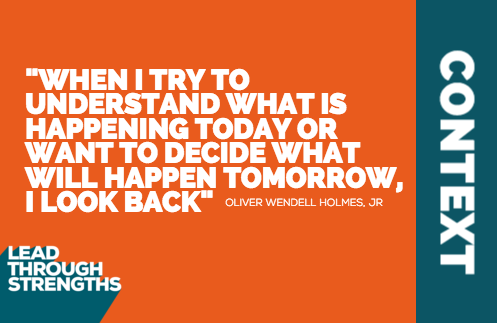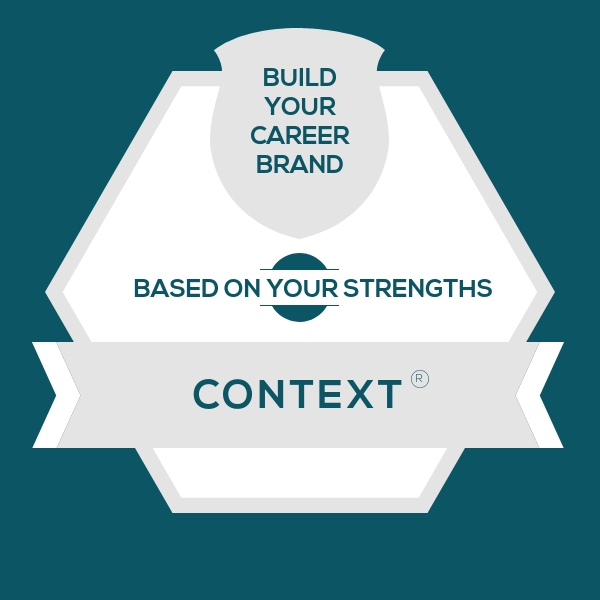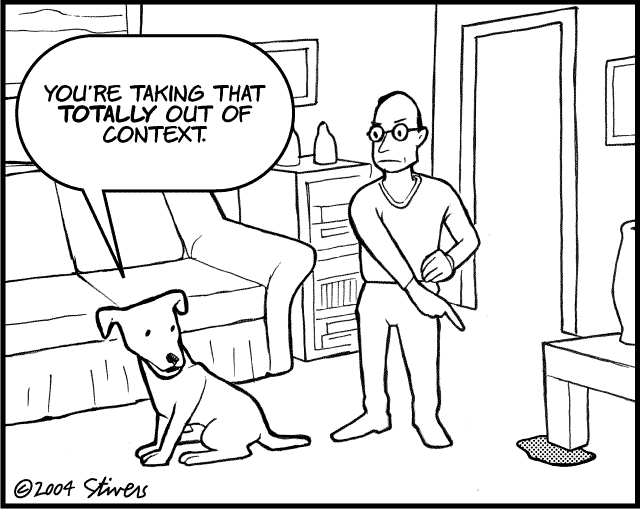People strong in the Context theme enjoy thinking about the past. They understand the present by researching its history.
You can tell a person strong in Context by these attributes (source: Dr. Hulme, APU):
- Look to the past to understand the present
- See patterns that emerge from studying what happened before
- Need to understand the history of an event and the surrounding dynamics of decisions
- Want to understand how we got to where we are
- Understanding initial intentions and underlying structure gives them confidence to make decisions
More about Context:
- Needs on a team: To know the back- ground
- As a Leader: Research history to understand
- In Conflict: Think about the past
- Partner with: Partner with someone with strong Futuristic or Strategic talents. This person’s fascination with what “could be” will stop you from being mired in the past and you will teach him or her about learning from the past.
- In academics: – loves to know the background – enjoys courses that use primary sources, original texts or artifacts – enjoys history, political science, comparative religion, philosophy, economics, and other courses that allow them to investigate the “root causes” of today’s events – dislikes courses that involve rote memorization
Where does Context Theme rank in the population?
- Overall, Context ranks 30th, occurring in around 9% of the population’s Top Five (6% of Females and 13% of Males)
31 |
|
17 |
25 |
Out of your Top 5 CliftonStrengths, it’s statistically:
- most likely to appear with Input and learner
- least likely to be found with Self-assurance or Command
The genius of your Context talent is found in the way you think about the past and use that form of thinking to learn, plan and solve problems. e present is important to you, but in your mind, the present is best understood by seeking to understand what has led up to the present. us, your mind often goes backwards and looks for what has caused what we are experiencing today. is look to the past gives great wisdom for understanding the present and forms a basis for making informed decisions and plans in the present and for the future. e genius of your Context way of thinking provides you with a basis for making high quality decisions and plans and for problem-solving. In addition, as you apply the genius of your Context way of thinking when you learn, you will learn with great understanding which results in high achievement.

At your best (Balcony):
-
has a robust historical frame of reference, learns lessons from the past, knows how things came to be, can leverage knowledge of the past
At your worst (Basement):
-
Basement: slow to move and react to change, closed-minded, lives in the past

Context may be one of your signature themes if…
- You look back into the past to understand the chaotic and confusing present scenario.
- You feel life was so much simpler back when the blueprints were first being drawn up.
- Understanding “how we got here” brings you a greater sense of confidence.
- The future scares you less when you think about how the seeds were sown in the past.
- You are uncertain about new people and new situations, but become oriented in time.
- Asking questions can clarify a situation and give you the historical context you need.
- Source: Let’s Talk Personality
A more detailed explanation from Gallup:
You look back. You look back because that is where the answers lie. You look back to understand the present. From your vantage point the present is unstable, a confusing clamor of competing voices. It is only by casting your mind back to an earlier time, a time when the plans were being drawn up, that the present regains its stability. The earlier time was a simpler time. It was a time of blueprints. As you look back, you begin to see these blueprints emerge. You realize what the initial intentions were. These blueprints or intentions have since become so embellished that they are almost unrecognizable, but now this Context theme reveals them again. This understanding brings you confidence. No longer disoriented, you make better decisions because you sense the underlying structure. You become a better partner because you understand how your colleagues came to be who they are. And counterintuitively you become wiser about the future because you saw its seeds being sown in the past. Faced with new people and new situations, it will take you a little time to orient yourself, but you must give yourself this time. You must discipline yourself to ask the questions and allow the blueprints to emerge because no matter what the situation, if you haven’t seen the blueprints, you will have less confidence in your decisions.
Action Items for This Theme
- Collect memories through photographs and written materials — they can be motivational for you.
- Read historical novels, non-fiction, or biographies. You will discover many insights that will help you understand the present. You will think more clearly.
- Before planning begins on a project, encourage your colleagues to study past projects.
- Help them appreciate the statement that “those who cannot remember the past are condemned to repeat it.”
- If you are in a role that requires teaching others, build your lessons around case studies. You will enjoy the search for the appropriate case, and your students will learn from these precedents. Use your understanding of the past to help others map the future.
- Help your organization strengthen its culture via folklore. For example, collect symbols and stories that represent the best of the past, or suggest naming an award after a person who embodied the best of the past.
Be ready to:
- Partner with someone with a strong Futuristic or Strategic theme. This person’s fascination with what “could be” will stop you from becoming mired in the past, while your deep understanding of Context will stop him or her from ignoring the lessons of the past. Together you are more likely to create something that lasts.
- Accept change. Remember that the Context theme does not equate with “living in the past.” Instead, you can actually become known as an active agent for positive change. Your strong Context theme should allow you to identify more clearly than most the aspects of the past that can be discarded, and those that must be retained in order to build a sustainable future.
- The Clifton StrengthsFinder and the 34 Clifton StrengthsFinder theme names are protected by copyright of Gallup Inc., 2000. All rights reserved.
For the more visually inclined:
A fantastic website with insightful discussion of Context, including
 Building your brand through this strengths
Building your brand through this strengths- Strengthening your performance at work
- Tips for managing someone with this strengths
- Partnering with someone with this strength

- Gallup on How You Can Productively Aim Your Context Talents
- Many universities use the StrengthsQuest Workbook to help you build relationships, more effectively study and find meaning in what you do.
- South Mountain Community College offers up ideas on Applying your Talents in Career Discovery and Applying your Talents in Academics
- Western Texas tells us about Using your Strengths In the Job Search, Interview and New Position
- Weber State University has posted action plan worksheets for each of Gallup’s 34 strengthsfinder talents.
 From Lead Through Strengths listen/read:
From Lead Through Strengths listen/read:
Career Branding When Context Is Your Strength includes an audio file exploring:
1. Career Branding
2. Red Flag Situations At Work
3. Fresh Application Ideas
View this post on Instagram
View this post on Instagram
THEME INSIGHTS:
- I am (Being) ———-> Appreciative of my predecessors and prior events
- I will (Doing) ———-> Remember Important history
- I Bring (Contribution) ———-> Accurate memories and valuable memorabilia
- I need (Requirement) ———-> Relevant background for discussions/decisions
- I love (Value) —————> The retrospective
- I Hate (Value) —————> When the past is forgotten
- Metaphor/Image ———-> Rearview Mirros —- essential for safe driving
- Barrier Label ———-> Stuck in the past
THEME CONTRAST:
- CONTEXT: I naturally remember and revere what has been.
- FUTURISTIC: I naturally anticipate and imagine what could or should be.————————————————————————————————-
- CONTEXT: I can proceed when I understand history
- FOCUS: I can proceed when the goal is clear
 Season 1:
Season 1:
- Season 2:
- Theme Dynamics
- Highly recommended: Utilize the Called to Coach worksheet for Context as you listen.
- Comparing and Contrasting Context
- Season 3:
- Season 4:
- Season 5:
- Season 6: Developing Teams and Managers
- Theme addicts is a series created by UnleashStrengths to highlight the massive impact the StrengthsFinder assessment through interviews and discussions.
- Lead through your strengths features many interesting guests and Career Q and A about leverage your strengths at work.
- Maximize Your Strengths features interviews and discussion on developing your strengths. She really drills into each of the themes by interviewing real people on how a specific theme shows up in their lives.
- Called to Coach is a webcast resource for those who want to help others discover and use their strengths. We have Gallup experts and independent strengths coaches share tactics, insights and strategies to help coaches maximize the talent of individuals, teams and organizations around the world.
- ISOGO TV promises a lot: So dramatically increase your energy and decrease your frustration at work, that you cannot help but take the Strengths paradigm home to your family. Fueling life-changing stories.
- The True Strength Podcast by Ian Pettigrew (Kingfisher Coaching) features inspiring true stories of how people succeed through applying their strengths and being resilient. It often includes a Gallup StrengthsFinder profile.
- If you are looking to identify and develop your strengths and talents, take calculated risks and make decisions, The Strengths Revolution with Steve Morgan will help your personal development, as well as helping you support your clients, employees, teams and wider organisations. Knowing your strengths will also support positive risk-taking and decision making as part of good risk management.

 Sources:
Sources:

Worth Reading
Listen to “Gallup Theme Thursday Season 2 – Context” on Spreaker.
Go Put Your Strengths to Work: 6 Powerful Steps to Achieve Outstanding Performance
Go deeper
Listen to “Context – Gallup’s Theme Thursday” on Spreaker.Listen to “Context – Gallup’s Theme Thursday” on Spreaker.
- Using your strengths in school and college wth great ideas on building relationships, study techniques, class selection, and extra curricular activities.
Listen to these podcasts
- Theme addicts is a series created by UnleashStrengths to highlight the massive impact the StrengthsFinder assessment through interviews and disucssions.
- Lead through your strengths features many interesting guests and Career Q and A about leverage your strengths at work.
- Maximize Your Strengths features interviews and disucssion on developing your strengths. She really drills into each of the themes by interviewing real people on how a specific theme shows up in their lives.
- Called to Coach is a webcast resource for those who want to help others discover and use their strengths. We have Gallup experts and independent strengths coaches share tactics, insights and strategies to help coaches maximize the talent of individuals, teams and organizations around the world.
- ISOGO TV promises a lot: So dramatically increase your energy and decrease your frustration at work, that you cannot help but take the Strengths paradigm home to your family. Fueling life-changing stories.
- The True Strength Podcast by Ian Pettigrew (Kingfisher Coaching) features inspiring true stories of how people succeed through applying their strengths and being resilient. It often includes a Gallup StrengthsFinder profile.
- If you are looking to identify and develop your strengths and talents, take calculated risks and make decisions, The Strengths Revolution with Steve Morgan will help your personal development, as well as helping you support your clients, employees, teams and wider organisations. Knowing your strengths will also support positive risk-taking and decision making as part of good risk management.
Sources:










